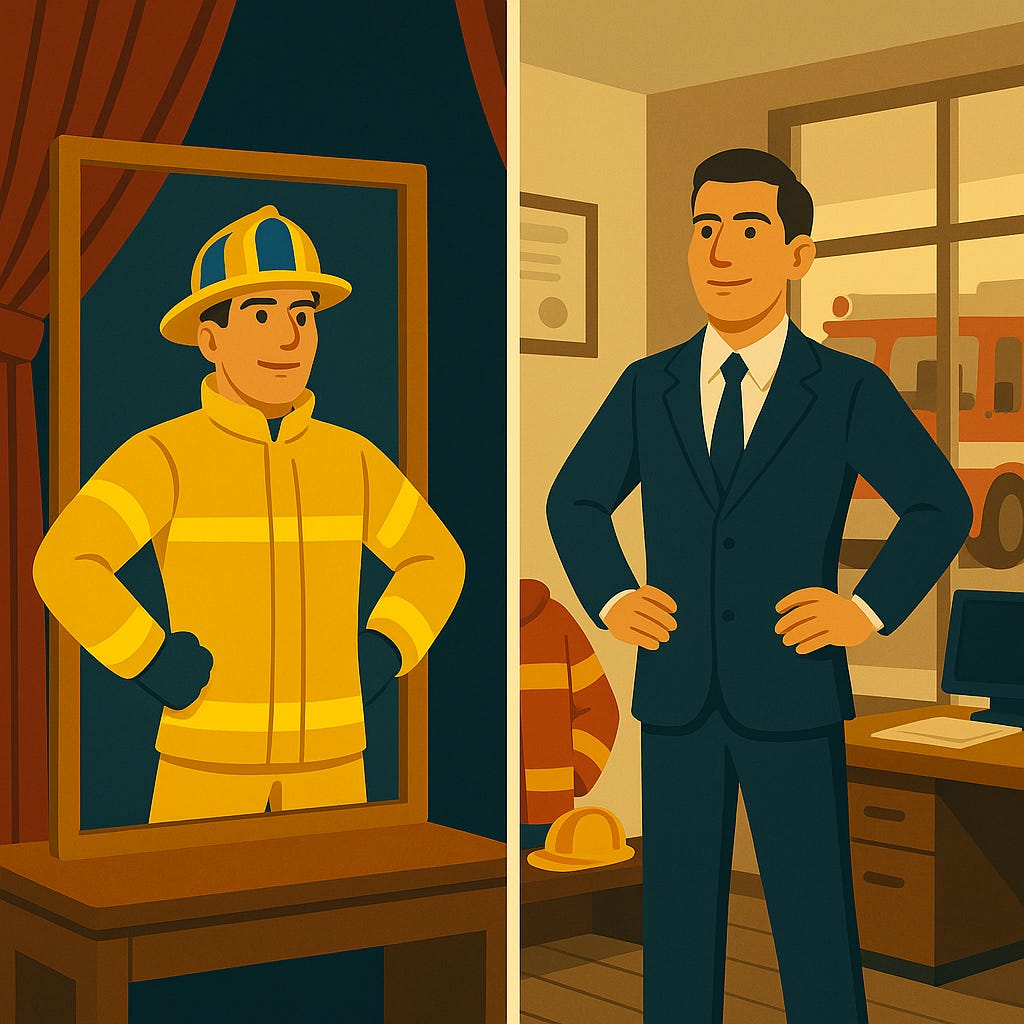When people hear that I majored in theater, they sometimes raise an eyebrow. In my current work as a fitness professional, firefighter, and EMT, it might seem like I left that education behind. But the truth is, my background in theater and public speaking has served me better than almost anything else I’ve ever learned. Communication, adaptability, and teamwork - these are skills that transcend the stage and have become the backbone of my professional life.
The Classic Rules
One of my early directors, Vonnie, used to say the rules for theatre are the same as the rules for life:
Be on time.
Know what you’re going to say.
Don’t bump into the furniture.
We always got a laugh out of that last one, but Vonnie’s wisdom stuck with me. Life’s rules really do mimic theatre’s rules - after all, as Shakespeare famously wrote, “All the world’s a stage, and all the men and women merely players.” The lessons I learned on the stage have proven just as valuable in the firehouse and beyond.
Over the years, I’ve collected my own set of “theatre rules” that I believe apply to life well beyond the footlights. Here are some that have guided me, no matter what part I’m playing.
1. Know Your Role
In theater, every part matters. But an actor in a supporting role who tries to steal the spotlight is said to be “upstaging the lead.” It’s just as important for the lead to be gracious and supportive of the ensemble, rather than “playing the diva.” The same goes for any organization: like the best theatre ensembles, the best teams are built on mutual respect and support, where everyone understands their role and values the contributions of others. Are you supporting your leadership, or are you trying to take center stage when it’s not your turn? Are you leading your people with grace and empathy, and showing genuine appreciation for their contribution? Every role - no matter how minor it may seem - is essential to the success of the whole team.
2. Listen to Your Director (Mentor/Coach)
On stage, your interpretation of a character might not match what the audience sees. That’s where the director comes in, offering feedback and guidance from a broader perspective. In life, mentors, coaches, and supervisors play the same role. Listening to those with more experience - or simply a different viewpoint - can help you grow, adapt, and ultimately succeed. Humility and openness to feedback are strengths, not weaknesses.
3. Keep Learning
Natural talent is great, but it’s not enough. The best actors are always learning - taking workshops, studying new techniques, and seeking out ways to improve. The same is true in any field: if you stop learning, you stagnate. In my work as a firefighter and EMT, ongoing training and education are not just encouraged - they’re required. As our understanding of our world and our craft changes, so must we.
4. Practice
Actors rehearse constantly, whether for a scripted play or improvisational performance. Even improv requires preparation to be truly spontaneous. In the emergency services, we drill and practice scenarios so that, when the real thing happens, we’re ready. Practicing with others sharpens everyone’s skills and builds trust within the team. More importantly, regular practice and honest review don’t just keep us sharp - they deepen our understanding of our craft, revealing new insights and opportunities for growth each time we revisit the basics.
5. Call for a Line When You Need It
No matter how much you prepare, sometimes you forget your lines. On stage, you call for the prompter to help you out. In life, don’t be afraid to ask for help when you’re stuck. It takes humility to admit you don’t have all the answers, but that humility is the foundation of real confidence. When you’re willing to ask for and accept help, you not only keep things moving - you also strengthen relationships and build trust within your team. In my experience, those moments of vulnerability often lead to the strongest bonds, reminding everyone that we’re all in this together.

6. Be Prepared to Struggle
Theater is full of stories about struggling actors working side jobs to make ends meet. Success rarely comes overnight. In fact, most successes start with failures - often several failures. How we handle setbacks is more important than how we handle our successes. Just because you experience a failure doesn’t mean you are a failure. The real test is in how you respond: Do you learn, adapt, and keep moving forward? In life, as on stage, patience and perseverance are essential. Struggle isn’t a sign of weakness - it’s a sign that you’re pushing yourself to grow.
7. Own the Room
Confidence matters. In theater and public speaking, you have to “own the room” - take up space, project your voice, and command attention. Sometimes, you may not feel confident at all, but as Dale Carnegie famously said, “If you want to be enthusiastic, act enthusiastic.” The same goes for confidence: if you want to be confident, act confident. Studies show that adopting a “power pose” (standing tall with shoulders back and feet planted shoulder-width apart) can actually boost your confidence and presence. Whether I’m leading a fitness class or responding to an emergency, projecting confidence - sometimes even before I truly feel it - helps me communicate clearly and effectively. It’s not about arrogance; it’s about showing up fully and letting others know you’re present and engaged. Often, “playing the part” of a confident person is what helps you become one.
8. Dress the Part
Costume is a powerful tool for an actor. If you’re playing a Wall Street banker, you dress like a Wall Street banker. In life, how you present yourself matters. Dressing appropriately for your role or profession signals professionalism and readiness. In the emergency services, our uniform isn’t just about appearance - it’s about safety, trust, and teamwork. Looking the part helps you feel the part, and it reassures those around you that you’re prepared for the job at hand.
9. Embrace Tradition, But Don’t Get Stuck in It
Serious students of theater study the greats - Shakespeare, Chekhov, Hagen - but they also explore new works and fresh ideas. In any profession, it’s important to honor the foundations while staying open to innovation. Pablo Picasso famously said, “Learn the rules like a pro, so you can break them like an artist.” The best progress comes from building on tradition, not being limited by it. In firefighting, fitness, and EMS, I’ve seen firsthand how respecting the “old ways” while embracing emerging research and technology leads to the best outcomes for everyone. Master the basics, then don’t be afraid to adapt, improvise, and innovate.
10. Accept Praise Graciously
Actors sometimes struggle to accept applause, focusing on their mistakes instead of their successes. Others might let praise go to their heads. In life, it’s important to celebrate your achievements, but stay humble. Accept compliments with gratitude, let your mistakes keep you grounded, and remember that hubris can alienate those around you. Graciously accepting praise also reflects well on your team, as you acknowledge the collective effort behind every success.
11. Remember You’re Not Doing It for Yourself
Another influential director I worked with, Henry, once told me that theater is all about giving: the playwright gives to the director, who gives to the cast and crew, who then give to the audience. Life is much the same. Whether I’m on stage, in the gym, or at an emergency scene, the most meaningful moments come from serving others and paying it forward. When you focus on giving - your time, your effort, your care - you find a deeper sense of purpose and fulfillment.
Conclusion
Theatre taught me more than how to project my voice or memorize lines - it taught me how to live, work, and serve. These rules have shaped my journey from the stage to the firehouse and beyond. No matter your profession, I believe these “theatre rules” can help you communicate better, work smarter, and live with greater purpose. We’re each players on the world’s stage - let’s make our performances count.






